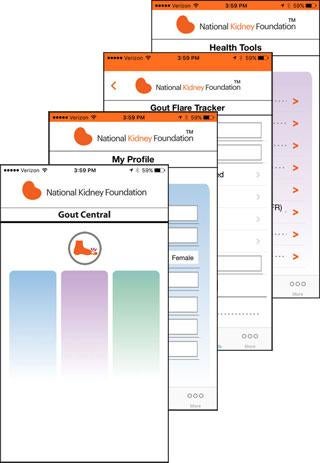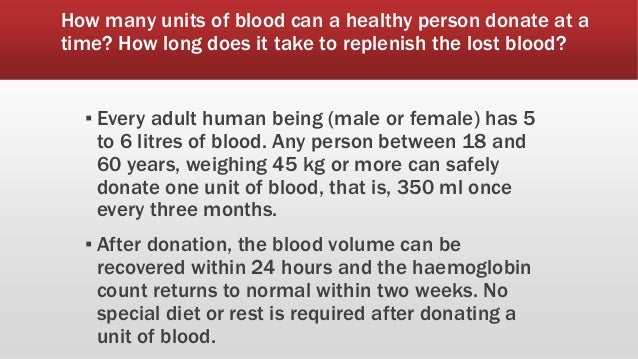Why is 50 kg the minimum weight to donate blood?
Donating blood recommendations. 1. What you need to know is that most people that are in a good general health can give blood. The age condition varies between 17 and 65 but there are still weight criteria to be met (having at least 50kg/110.2lbs. 2. Do you know how much blood you actually donate? It is up to 500ml, just under a pint. 3.
What is the minimum weight for donating blood?
legal donor weight of 50kg at which a donation can be accepted. This is not appropriate for double red cell donations because of the increased volume, and …
Do you gain weight after donating blood?
To donate blood, the minimum weight is 50 kg. We need you to be above a minimum weight because the amount of blood your body contains is related to your weight and height. If our standard donation represents too high a volume, it's not safe for you to donate.
What are the weight restrictions for donating blood?
Weight: You must weigh at least 110 pounds to be eligible for blood donation for your own safety. Blood volume is in proportion to body weight. Blood volume is in proportion to body weight. Donors who weigh less than 110 pounds may not tolerate the removal of the required volume of blood as well as those who weigh more than 110 pounds.

What is the minimum weight of a Donar to donate the blood?
Weight: You weigh at least 50 kg. * In some countries, donors of whole blood donations should weigh at least 45 kg to donate 350 ml ± 10% .
How much do you have to weigh at 5'3 to give blood?
Female Donors 18-Years-Old or YoungerIf you are:5'1” or less5'3”You must weigh at least:133 lbs.124 lbs.Sep 17, 2020
Why do you have to be 110 lbs to donate blood?
Weight: You must weigh at least 110 pounds to be eligible for blood donation for your own safety. Blood volume is in proportion to body weight. Donors who weigh less than 110 pounds may not tolerate the removal of the required volume of blood as well as those who weigh more than 110 pounds.
What is the criteria for donating blood?
Criteria to donate blood The donor must be fit and healthy, and should not be suffering from transmittable diseases. Age and weight- Between 18–65 years old and should weigh a minimum of 50 kg. Pulse rate- Between 50 and 100 without irregularities. Hemoglobin level- A minimum of 12.5 g/dL.
What are the risks of HIV?
Hemoglobin, Travel, Cancer, Medications, Hepatitis, and HIV Risk: 1 Intravenous drug abusers: HIV, HBV, HCV and HTLV 2 Transplant patients: animal tissue or organs 3 People who have recently traveled to or lived abroad in certain countries may be excluded because they are at risk for transmitting agents such as malaria or variant Creutzfeldt-Jakob Disease
What is the age limit for blood donation?
There is no upper age limit for blood donation as long as you are well with no restrictions or limitations to your activities. High Blood Pressure: Acceptable as long as your blood pressure is below 180 systolic (first number) and below 100 diastolic (second number) at the time of donation.
How much weight do you need to donate blood?
Weight: You must weigh at least 110 pounds to be eligible for blood donation for your own safety. Blood volume is in proportion to body weight. Donors who weigh less than 110 pounds may not tolerate the removal of the required volume of blood as well as those who weigh more than 110 pounds.
How to donate to the Red Cross?
Please make sure to bring your photo identification or Red Cross donor card with you. You should feel well on the day of donation. If you're not feeling well, we ask that you wait and donate when you're better. Here are some other helpful tips to prepare: 1 Get at least eight hours of sleep the night before your appointment 2 Eat a healthy breakfast or lunch – or both, if you’re donating later in the day 3 Choose lean proteins (lean meat, cheese and yogurt) or complex carbohydrates (bread, cereal and fruit) and avoid fatty foods 4 Drink a few extra glasses of water, including an extra glass about 10 to 30 minutes before your donation 5 Wear comfortable clothing with sleeves that can be raised above your elbow
What is ferritin in blood?
Ferritin is a protein that stores iron in tissues throughout your body. To continue providing the best possible donation experience for young donors whose bodies are still growing, the Red Cross is testing ferritin levels for all whole blood and power red donors between the ages of 16 and 18.
Why is iron important for blood donation?
Low iron, also known as iron deficiency, may lead to health problems, such as anemia, if left untreated. Healthy iron levels are important for your overall health and help to maintain strength and energy.
How old do you have to be to donate blood?
Be at least 17 years old in most states (16 years old with parental consent in some states). Weigh at least 110 lbs. Additional height and weight requirements apply for donors 18 years old and younger and all high school student donors. Have not donated blood in the last 56 days. View All Eligibility Requirements.
Why Give Blood
You don't need a special reason to give blood. You just need your own reason.
What to Expect at Your Donation
Registration — You will sign in, show an ID, and be asked to read some required information.
How to Get Ready
Donors must have proof of age to ensure they meet the minimum age requirements and present a primary form of ID or two secondary forms of ID.
How many calories do you burn when you donate blood?
The University of California San Diego notes that people who donate blood burn about 650 calories in the process. But before you abandon your workout plan in favor of blood donation, keep in mind that you need to wait 56 days before you’re eligible to donate again. You also must meet all of the eligibility requirements each time you donate.
When is the best time to donate blood?
One of the best times to give blood is probably when weight loss is furthest from your mind—the holidays and summer vacation. The need for blood donations increases every year during holiday periods and the summer months. You can find locations to donate blood through the American Red Cross or your local hospital.
How much weight do you need to donate blood?
The American Red Cross requires donors to weigh at least 110 pounds 2. It notes that additional weight requirements apply to donors age 18 and younger and to all high school donors.
Can you smoke before blood donation?
Smoking Before Donating Blood. Learn More. You may not be a good candidate for blood donation if you are or have recently been on a very restrictive weight loss diet. The American Red Cross recommends you maintain a healthy iron level in your diet prior to donation 2.
Question
John asks: I just donated blood today, and it gave me a thought: is this a good way to lose weight? After all, that pint weighed around one pound. I know we our bodies make up for the lost fluid, but the protein and lipids in our blood are "lost" to our metabolism, so this must "cost" our bodies some calories.
Answer
Chris Smith put John's question to Cambridge University cardiologist, James Rudd...
Why is the Red Cross important?
The highest priorities of the Red Cross are the safety of the blood supply and our blood donors. Some individuals may be at risk of transferring communicable disease through blood donation due to exposure via travel or other activities or may encounter problems with blood donation due to their health.
What is the process of collecting blood from a donor?
Apheresis is the process by which platelets and other specific blood components (red cells or plasma) are collected from a donor. The word “apheresis” is derived from the Greek word aphaeresis meaning “to take away.”. This process is accomplished by using a machine called a cell separator.
How does blood donation work?
The donation itself is only about 8-10 minutes on average. The steps in the process are:#N#Registration#N#You will complete donor registration, which includes information such as your name, address, phone number, and donor identification number (if you have one).#N#You will be asked to show a donor card, driver’s license or two other forms of ID.#N#Health History and Mini Physical#N#You will answer some questions during a private and confidential interview about your health history and the places you have traveled.#N#You will have your temperature, hemoglobin, blood pressure and pulse checked.#N#Donation#N#We will cleanse an area on your arm and insert a brand–new, sterile needle for the blood draw. This feels like a quick pinch and is over in seconds.#N#You will have some time to relax while the bag is filling. (For a whole blood donation, it is about 8-10 minutes. If you are donating platelets, red cells or plasma by apheresis the collection can take up to 2 hours.)#N#When approximately a pint of blood has been collected, the donation is complete and a staff person will place a bandage on your arm.#N#Refreshments#N#You will spend a few minutes enjoying refreshments to allow your body time to adjust to the slight decrease in fluid volume.#N#After 10-15 minutes you can then leave the donation site and continue with your normal daily activities.#N#Enjoy the feeling of accomplishment knowing that you have helped to save lives.#N#Your gift of blood may help up to three people. Donated red blood cells do not last forever. They have a shelf-life of up to 42 days. A healthy donor may donate every 56 days.
Can you wear a mask with a valve?
Valve face masks are not permitted. Face shields can be worn in addition to face masks but not as a substitute. The Red Cross will adhere to more stringent face mask requirements per state and/or local guidance or at the request of our blood drive sponsors.
Why is the Red Cross collecting plasma?
The Red Cross is collecting plasma from recovered COVID-19 patients to help current patients battling this new coronavirus. COVID-19 convalescent plasma is a type of blood donation collected from individuals who have recovered from COVID-19 and contains antibodies that might help patients actively fighting the virus.
How long do red blood cells last?
Your gift of blood may help up to three people. Donated red blood cells do not last forever. They have a shelf-life of up to 42 days. A healthy donor may donate every 56 days.
Why do we measure blood pressure?
When you come to donate blood at the American Red Cross, we measure your blood pressure, pulse, temperature, and hemoglobin because the results provide information about your current health at the time of your donation. The Red Cross does not diagnose medical conditions or offer treatment.

Popular Posts:
- 1. can a person who is o negative donate a kidney to a positive?
- 2. how to donate a motorcylce in florida
- 3. where to donate crutches
- 4. where to donate old bras
- 5. people who cant donate blood
- 6. how to donate to the ryan white program
- 7. where to donate mens dress clothes
- 8. where can you donate colored hair
- 9. where to donate construction materials
- 10. how to donate hair in georgia -locks